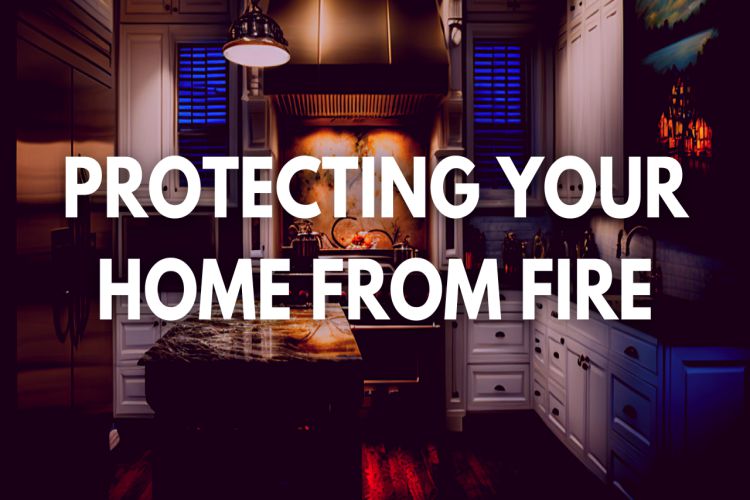 We tend to think of our homes as safe, secure spaces that we can relax and unwind in. However, even a well-kept home may harbor some hidden hazards that can pose a serious risk to everyone dwelling within. One risk that is often overlooked is that of fire hazards. In this article, we discuss how to detect possible fire hazards, minimize your household’s risk, and deal with an emergency if an accident happens.
We tend to think of our homes as safe, secure spaces that we can relax and unwind in. However, even a well-kept home may harbor some hidden hazards that can pose a serious risk to everyone dwelling within. One risk that is often overlooked is that of fire hazards. In this article, we discuss how to detect possible fire hazards, minimize your household’s risk, and deal with an emergency if an accident happens.
What Are Common Causes of Household Fires?
Household fires are thankfully fairly rare, but knowing how and why they are started can help you maintain a safe home. If a fire does start due to unsafe household conditions, it may be worth contacting a personal injury attorney to determine whether you can recover compensation for any damages suffered. Some of the most common causes of house fires include:
- Cooking Catastrophes: From 2017 – 2021, cooking was the leading cause of reported house fires and the second-highest cause of home fire deaths, per the National Fire Protection Association. Unattended cooking was one of the leading causes of kitchen accidents, but unsafe appliances and unsafe cooking techniques also contribute to many annual accidents. To prevent cooking fires, people must remain attentive at all times, store flammable items safely, and use ventilation properly to prevent heat buildup. Grease filters should be cleaned routinely to prevent buildup.
- Unsafe Heating Systems: Space heaters, furnaces, and fireplaces can offer warmth on cold days, but these items should be used carefully. Faulty equipment, blocked vents, or careless use can quickly have tragic consequences. You should have your fireplace and heating system inspected by trained professionals regularly. Keep curtains and flammable furniture away from fireplaces and heaters at all times. When using a fireplace, choose proper firewood and be sure to put out the embers before going to bed.
- Electrical Issues: Electrical systems may not be visible to the naked eye, but problems with your home’s wiring or electronics will certainly make themselves known. Overloaded circuits, outdated wiring, and damaged appliances can easily start a serious fire. Warning signs of a potential issue include flickering lights, buzzing sounds, or warm outlets. To protect your home, use surge protectors to shield devices from voltage spikes and Ground Fault Circuit Interrupters (GFCIs) anywhere that water and electricity may mix. To know more about surge protection you may visit https://wiredsc.com/surge-protectors/
- Smoking and Untended Candles: It can be comforting to light a candle or to take a smoke break after a long day, but it’s important to keep fire safety in mind. If you choose to smoke, you should do so outdoors. You should never smoke in bed or near flammable items. When lighting a candle, place it away from flammable materials and make sure you’re nearby as long as it is lit.
Tips for Preventing Household Fires
Now that we’ve explained some common fire risks, it’s time to discuss ways to reduce your household’s risk. First and foremost, you should make sure that your home has functional smoke alarms. Your house’s smoke alarms are the first line of defense against a fire. Ensure they are properly installed in every sleeping area and on each level of your home, and test them monthly.
You should also purchase a fire extinguisher suitable for the types of fire you may reasonably encounter and be sure you know how to use it in an emergency. Regularly practice escape plans with your family. Designate a clear exit route and practice getting out of your home in a hurry, in case you need to evacuate. As an additional precaution, store flammable materials like gasoline or paint in a safe, well-ventilated location that is far from potential ignition sources.
You also need to take care to fireproof your kitchen as thoroughly as possible. Never leave children unattended near cooking surfaces and educate them about kitchen safety rules. Using appliances with knobs and controls out of a child’s reach is a good idea. When making meals, always use a sturdy potholder and oven mitts designed to handle the temperatures you’re working with. Don’t wear loose clothing, as it may catch fire. Be sure that the stovetop is fully cooled down before attempting to clean grease splatters.
What Should You Do if a House Fire Breaks Out?
In the worst-case scenario that a fire does break out in your home, immediate action is needed. Call 911 immediately to report the fire and request assistance. Evacuate right away and make sure that everyone makes it out of the building. Use your pre-determined evacuation route and do not take elevators. Once outside, get to a safe distance from the burning building. Do not re-enter, even for cherished belongings or a family pet. Smoke inhalation can be fatal, even over a short period of exposure.
Practicing Fire Safety To Lower Your Household’s Risk
Fire safety should be an ongoing journey of awareness and preparation. By understanding common home fire hazards, implementing preventive measures, and equipping yourself with the knowledge and tools to respond effectively, you reduce your risk of experiencing a deadly blaze. We hope this guide helps you and your family stay safe throughout the year.




